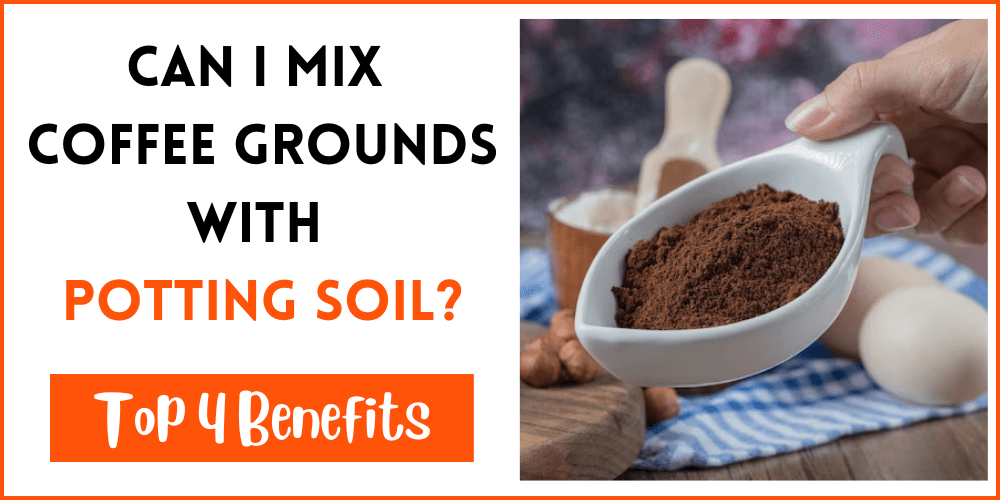

If you’re a coffee lover and a gardener. Chances are you have considered using your leftover coffee grounds in your potted plants. But is it safe to Can I Mix Coffee Grounds With Potting Soil? The answer is yes, but there are a few crucial points to remember.
Can I Mix Coffee Grounds With Potting Soil?
Coffee grounds are rich in nitrogen, and potassium. And other necessary minerals for plants to survive. Identify Can I Mix Coffee Grounds With Potting Soil? These nutrients make it a great amendment for potting soil. Which can be lacking in these elements. However, coffee grounds also have a high acidity level. Which can affect the pH balance of your potting soil.
Coffee Grounds Composition And Properties
Coffee grounds are composed of cellulose, lignin, and other plant materials. These ingredients decompose slowly, providing a steady release of nutrients to plants. They also have a fine texture that makes them an excellent addition to potting soil. Helping with drainage and aeration.
Benefits Of Mixing Coffee Grounds With Potting Soil
Now that we understand the composition and properties of coffee grounds. Let’s explore the benefits of mixing them with potting soil.
- Improved Soil Structure: That which is organic in coffee grounds.. That helps improve soil structure by increasing its ability to retain moisture and nutrients. While also promoting better drainage.
- Enhanced Nutrient Content: As mentioned earlier. Coffee grounds are rich in essential nutrients that plants need for healthy growth.
- Natural Pest Deterrent: Coffee grounds have been shown to have a repellent effect on certain pests, such as slugs and snails.
- Environmentally Friendly: Use coffee grounds in your potting soil mix. You are repurposing a waste product and reducing your carbon footprint.
Considerations When Mixing Coffee Grounds
While coffee grounds have many benefits. There are some considerations to keep in mind when mixing them with potting soil. As mentioned earlier, coffee grounds have a high acidity level. Which can alter the pH balance of your soil. Most plants prefer a pH range between slightly acidic and neutral. So it’s essential to monitor the pH level of your soil and adjust accordingly.
Another consideration is the amount of coffee grounds you use. Adding too much can result in a nitrogen overdose, which can harm your plants. It’s best to mix them with other organic materials like compost. Or aged manure to balance out the nutrients.
Preparing Coffee Grounds For Gardening
Before adding coffee grounds to your potting soil. It’s essential to prepare them correctly. Fresh coffee grounds are highly acidic, so it’s best to age them before use. This can be done by spreading them out on a sheet of newspaper and allowing them to dry for a few days. You can also mix them with other organic materials and let the mixture sit for a few weeks before using.
How To Mix Coffee Grounds With Potting Soil
To mix coffee grounds with potting soil, start by adding a thin layer of coffee grounds on top of your potting soil. Then, mix it in with the existing soil using a trowel or hand rake. It’s best to add small amounts at a time and regularly check the pH level as you go.
Types Of Plants That Benefit From Coffee Grounds
Coffee grounds can benefit a variety of plants. Including acid-loving ones like blueberries, azaleas, and rhododendrons. They are also beneficial for plants that thrive in nutrient-rich soil. Such as tomatoes and peppers. However, it’s essential to do your research before adding coffee grounds to specific plant species.
Related Guides:
What Are The Disadvantages Of Coffee Grounds As Fertilizer?
Despite their benefits, there are some disadvantages to using coffee grounds as fertilizer for your plants. For one, coffee grounds have a slightly acidic pH level. They can become more alkaline as they decompose, which may not be suitable for all plants. Additionally, pests like slugs and snails may be drawn to coffee grounds. Which can be harmful to your plants.
How Much Coffee Grounds To Add To Soil?
The general rule of thumb is to add no more than 20% coffee grounds to your potting soil mix. This means that for every five parts of soil, you can add one part of coffee grounds. It is also important to mix the grounds thoroughly with the soil to prevent clumping and ensure the even distribution of nutrients.
Is It Good To Put Coffee Grounds In Potting Soil?
It is generally good to add coffee grounds to potting soil. As they can provide many benefits for your plants. However, as mentioned before, it is important not to overdo it. And to mix the grounds with other organic materials for a well-balanced blend.
Is Too Much Coffee Grounds Bad For Soil?
Too much coffee grounds can be harmful to soil and plants. As mentioned earlier. They can become more alkaline as they decompose, which may affect plant growth. Additionally, excessive amounts of coffee grounds can also attract pests. And inhibit the absorption of other nutrients by plants.
Final Thoughts:
Mixing coffee grounds with potting soil can be beneficial for your plants. But it’s important to exercise moderation. Explore Can I Mix Coffee Grounds With Potting Soil? Keep an eye on the pH level of your soil and make adjustments as needed. With proper preparation and usage, coffee grounds can help promote healthy plant growth. And leading to a more abundant and vibrant garden. So next time you’re wondering what to do with your leftover coffee grounds. Don’t hesitate to mix them with your potting soil and watch your plants thrive.
Sources:
- By Michael Shaw, Can we use coffee ground as plant soil? Posted 8 years ago



